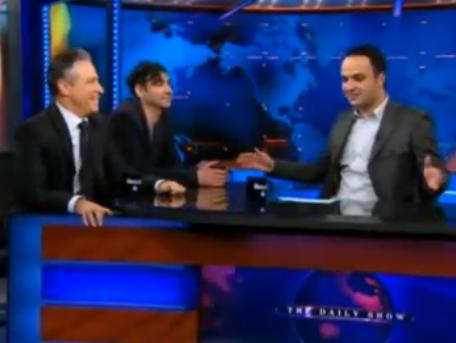
Hopefully Parazit will be on the Jon Stewart Show again, so just in case Kambiz Hosseini didn’t catch it himself watching and re watching his performance, here’s a suggestion: don’t laugh at the host’s jokes louder than the audience would. It doesn’t help him. The feel good pats on the back and mutual admiration seemed sincere enough (and then some), so why push it with the kind of taarof Iranians are on to and Americans are confused by? Saman Arbabi was perfect, though. Other than that bit of feedback directed at Parazit, the rest is a review of this episode of Jon Stewart’s show, not of the Parazit program.
Stewart bills the Dialy Show as comedy, but he must be fully aware that what he does is political commentary in a humorous package -much like Parazit. Though he is not a reporter, his audience thinks of him as also being in the journalism business. So he was ethically obligated to make it clear to those unfamiliar with VOA that this is a broadcasting service of the US government and not a typical TV station. Though this fact stands as an interesting interview question on its own and merits emphasis from the purely entertainment angle, we only get vague hints of it during the show.
As a matter of fact, not bringing up the matter seemed awkward at times. “I got a hold of your show on the web,” said Stewart. Those unfamiliar with VOA would wonder why Stewart didn’t respect the show enough to watch it as it was aired on satellite. Even if the host has watched the guest’s show as an obscure rerun on the web, he would come across as arrogant to mention it-as though the show was not worth his quality time. Of course arrogance is not what Stewart meant to convey at all. He couldn’t have watched the show on Satellite TV because of the following US law regarding VOA: Voice of America is forbidden to broadcast directly to American citizens. This law was passed in 1948 to protect the American public from propaganda coming from its own government. In other words VOA does real journalism when it serves the purpose but one of its missions is to distort the truth or lie if political circumstance demands it.
The most awkward result of this omission was when Stewart brought up the subject of vitriol in criticizing US politicians, and Hosseini took the Fifth. “Honestly,” he said, “we don’t care that much about American politics.” Even if Parazit doesn’t concern itself with American politics, Hosseini has lived in this country for over ten years. How could a political satirist be so inattentive to the important affairs of the American public? Is America not worth his attention or concern, despite his having lived here for so long? Again, this was far from what Hosseini wished to convey; the fiasco was the result of Stewart’s incomplete disclosure about Parazit’s US government funding. And he paid for it, laughingly expressing frustration with, “I worked on that question for fifteen bleeping minutes.”
There were ways, however, in which this absence of explicit disclosure rescued the Iranian- American aberoo. Indulging my nationalistic demon as only Iranians can I would welcome it if everyone believed we Iranian-Americans are actually responsible for this groundbreaking show. I truly wish it was the Iranian-American community who had mustered the organization and funding to encourage these two bright talents to produce their primetime quality show. Hey, why not shut up and take credit for a show that sticks in the IRI craw as painfully as any resistance at home? Well, because the angels on both sides our Iranian-American hyphen would feel like crap if we didn’t clearly disclose the relevant facts to those who would trust us to do just that.
As we say in Iran, “Daashtim Jon joon!” or as they say in America, “Say it ain’t so Jon!”






